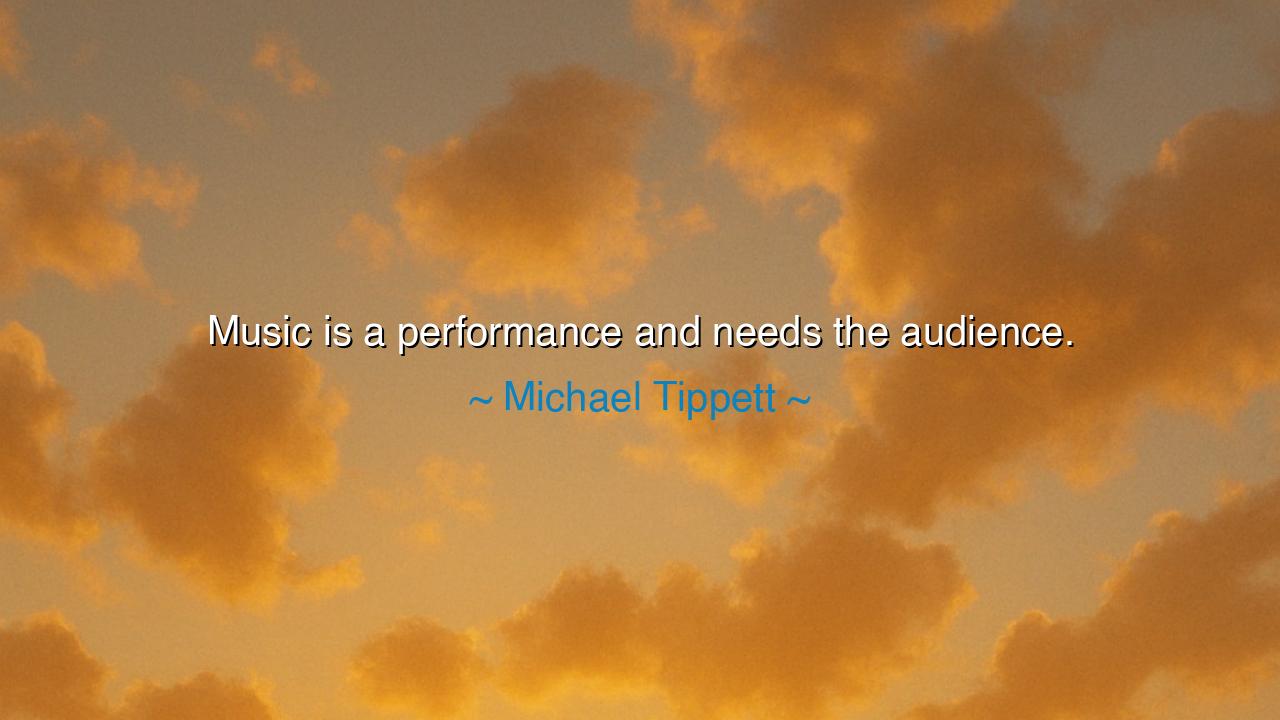
Music is a performance and needs the audience.






When Michael Tippett declared, “Music is a performance and needs the audience,” he revealed a profound truth that resounds across the ages: that music is not born for silence, nor created for the composer alone, but for the shared experience of many hearts bound together by sound. A song written yet never heard is like a flame hidden beneath the earth—it exists, but it cannot give light or warmth. It is in the presence of the audience that the art becomes alive, for their ears, their emotions, and their spirits complete what the musician begins.
The ancients knew this well. The Greeks spoke of the lyre of Orpheus, whose melodies could tame wild beasts and soften even the hearts of gods. Yet his gift meant nothing without others to witness it, to be moved, to be transformed. Music, in their understanding, was both an offering and a communion. A solitary melody, unshared, was but half a miracle. But when the people gathered—when breath, strings, and voice wove together before a listening crowd—it became holy, a shared act of transformation. Tippett’s words remind us that art is not finished until it has been received.
History bears witness to this truth. Think of Ludwig van Beethoven. In his final years, when deafness enclosed him in silence, he could no longer hear his own compositions with mortal ears. Yet he still raised his baton, and when his Ninth Symphony was performed, he turned to see the thunderous applause of the audience he could not hear. In that moment, it was the audience who completed the work, reflecting back to him the grandeur he had given them. The music became a bridge—his silence reaching their sound, their sound reaching his silence. Without them, the triumph would have been incomplete.
There is also within Tippett’s teaching the reminder that performance is an act of courage. To perform is to give oneself to the judgment, the love, the misunderstanding, and the wonder of others. It is to stand before the audience and say, “Here I am, here is my soul in sound.” This vulnerability transforms the private act of composition into a communal act of courage. And the audience, too, is not passive—they bring their listening, their openness, their presence, and in so doing, they shape the performance itself.
This truth extends beyond music. Every gift of the human spirit—whether it be words, deeds, or visions—requires others to receive it. A story must have readers, a painting must have eyes, a leader must have followers, and a teacher must have students. Creation alone is not enough; it is in the sharing, in the meeting of giver and receiver, that meaning is fulfilled. Tippett’s words, though spoken of music, apply to all of life: we are made not for isolation, but for communion.
The lesson is clear: if you are an artist, do not hoard your gift. Share it, even if imperfect, for it is in the sharing that it becomes whole. If you are a listener, do not think your role small, for by your listening, you breathe life into the performance. In every relationship, every conversation, every act of service, remember that you are both performer and audience, giver and receiver, completing each other in turn.
Therefore, let us live as both musicians and audiences in the great symphony of existence. Create boldly, listen deeply, and remember that no song is complete until it has been heard. For as Tippett declared, music needs the audience, and so too does every act of the human soul. Together, we make the performance of life whole.






AAdministratorAdministrator
Welcome, honored guests. Please leave a comment, we will respond soon